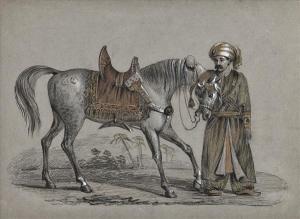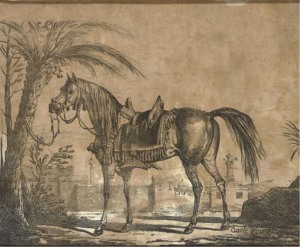THE ARAB’S FAREWELL TO HIS HORSE
by Carle Vernet
What a couple of weeks it’s been! Some sad times associated with one of our dearest older mares, and not enough time to do a blog. Trying to keep up with the editing of my next book and occasionally thinking about Facebook.
I hope with this beautiful poem below I can make up for my tardiness.
At least over the last few days I’ve been able to resume some sort of routine regarding my latest book. I’ve sorted the photographs for the cover and after much discussion I’ve decided to go with my working title ‘Consequences’. It suits the story perfectly. Once again I’m attempting to juggle way too many balls in the air. Let me tell you I’m no juggler!
Today I dropped all the balls and took some time out! Years ago I came across this AMAZING poem and it’s always been a favourite. I’m sure many of you have read the words but they are so incredibly touching I thought you would enjoy reading them again.
THE ARAB’S FAREWELL TO HIS HORSE
By Caroline Norton (1808-1877)
My Beautiful! My Beautiful! That standest meekly by,
With thy proudly arch’d and glossy neck, and dark and fiery eye,
Fret not to roam the desert now, with all thy winged speed;
I may not mount on thee again,–thou’rt sold, my Arab steed!
Fret not with that impatient hoof,–snuff not the breezy wind-
The farther that thou fliest now, so far am I behind:
The stranger hath thy bridle-rein,–thy master hath his gold,
Fleet-limb’d and beautiful, farewell; thou’rt sold, my steed, thou’rt sold.
Farewell! Those free, untired limbs full many a mile must roam
To reach the chill and wintry sky which clouds the stranger’s home;
Some other hand, less fond, must now thy corn and bread prepare.
The silky mane I braided once must be another’s care!
The morning sun shall dawn again, but never more with thee
Shall I gallop through the desert paths, where we were wont to be;
Evening shall darken on the earth and o’er the sandy plain
Some other steed, with slower step, shall bear me home again.
Yes, thou must go! The wild, free breeze, the brilliant sun and sky,
Thy master’s home-from all of these my exiled one must fly;
Thy proud dark eye will grow less proud, thy step become less fleet,
And vainly shalt thou arch thy neck, thy master’s hand to meet.
Only in sleep shall I behold that dark eye, glancing bright;
Only in sleep shall hear again that step so firm and light;
And when I raise my dreaming arm to check or cheer thy speed,
Then must I, starting, wake to feel-thou’rt sold, My Arab steed!
Ah! Rudely then, unseen by me, some cruel hand may chide,
Till foam-wreaths lie, like crested waves, along thy panting side:
And the rich blood that’s in thee swells, in thy indignant pain,
Till careless eyes, which rest on thee, may count each started vein.
Will they ill use thee? If I thought-but no, it cannot be-
Thou art so swift, yet easy curb’d, so gentle, yet so free;
And yet, if haply, when thou’rt gone, my lonely heart should yearn,
Can the hand which casts thee from it now command thee to return?
Return! Alas! My Arab steed! What shall thy master do
When thou, who wast his all of joy, hast vanish’d from his view?
When the dim distance cheats mine eye, and through the gathering tears
Thy bright form, for a moment, like a false mirage appears;
Slow and unmounted shall I roam, with weary step alone
Where, with fleet step and joyous bound, thou oft hast borne me on;
And sitting down by that green well, I’ll pause and sadly think,
“It was here he bow’d his glossy neck when last I saw him drink!”
When last I saw thee drink!-Away! The fever’d dream is o’er,–
I could not live a day and know that we should meet no more!
They tempted me, my beautiful!-for hunger’s power is strong,–
They tempted me, my beautiful! But I have loved too long.
Who said that I had given thee up? Who said that thou wast sold?
Tis false,–’tis false! My Arab steed! I fling them back their gold!
Thus, thus, I leap upon thy back and scour the distant plains;
Away! Who overtakes us now shall claim thee for his pains!
by Carle Vernet
ABOUT THE POET
The daughter of Thomas Sheridan and the granddaughter of English poet, Richard Brinsley Sheridan, eight-year-old Caroline Sheridan found herself one of five children living in poverty when her father died. By the time she was sixteen, George Norton, a barrister who did not practice the law, asked her to marry him. Although she refused, she reconsidered and married him at age nineteen, partly to help the financial status of her family.
Caroline Norton was regularly beaten and viciously terrorized by her husband, who resented her clever wit. By the time she had separated from him in 1836, she had borne him three sons, one of whom, William, would die in childhood from an untreated cut from a riding accident; the untreated cut permitted blood poisoning to take the youngster’s life.
For the next twenty years Caroline fought vigorously against Norton’s attempts to deprive her of her income and to scandalize her name and reputation. She was already fairly well-known because of her poems and novels. For much of this time Caroline’s solace lay in her mastery of the written word and her efforts to overturn English law regarding women’s rights in Victorian England. As a result of her efforts to help divorced women retain custody of their children and their material wealth, the Marriage and Divorce Act of 1857 became her lasting legacy.
Caroline Norton died at age 69, only three months after marrying William Stirling Maxwell.
The poem above reflects the author’s devotion, love, and concern that a life entrusted to her should remain cared for, despite the personal privations of poverty and hunger. In spite of her own suffering and degradation, Caroline Norton demonstrated the values she held most dear: liberty and honour.
Visit Carmel Website at www.carmelrowley.com.au
Read sample chapters of either ‘Tails Carried High’
or ‘Danika and Yatimah from Egypt to the Outback’ http://www.carmelrowley.com.au/features.html


Leave a Reply